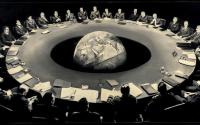24 January 2008
What does it take to bring on a new geological age? According to members of the Stratigraphy Commission of the Geological Society of London, one way of going about it would be to:1. Change the atmosphere's composition, thus modifying plants2. Change the distribution and diversity of species, thereby changing the future fossil record3. Acidify the oceans, which will modify mineral deposits on the ocean floorSound familiar? Yes, you guessed it – maybe this is the new geological age.The suggestion that the overtaking of planet Earth by one species – humans – kicked off a new age was first made by Paul Crutzen in 2002. Crutzen, a Nobel prize-winning chemist, said we should now consider that we are living in the Anthropocene, an age dominated by human activities.Since then, his term has caught on. Stick it in Google and you get over 42,000 hits. It's got its own Wikipedia entry. Scientists are using it – the International Geosphere-Biosphere Programme recently published a document with a chapter devoted to it. (Bill Gates hasn't caught on though – my spellchecker doesn't recognise it.)In spite of all this, and the apparent logic behind it, declaring the advent of a new geological age is no small matter. So although we may all – and I include scientists in that "we" – be perfectly happy to talk about the evils and blessings of the Anthropocene, we will not officially be living in it until a group of scientists at the International Union of Geological Sciences puts their seal on the term.And that won't happen – if indeed it does – for several more years.To kick-start the process of formalising the term, Jan Zalasiewicz and his colleagues at the Stratigraphy Commission of the Geological Society of London have laid down their case in favour. Their defence is featured on the cover of the February 2008 issue of GSA Today, published by the Geological Society of America.To some, it may seem obvious that humans are massively changing the environment, but what Zalasiewicz had to do was show that 10, 100, 500 million years down the line, if you were to slice through a chunk of sediment you would be able to identify a distinct layer that corresponds to our reign on Earth.The group says there is enough evidence around to suggest this will be the case. Ocean acidification, if it continues, could bring an end to corals which will change the nature of ocean rocks. Humans activities have triggered huge amounts of erosion, generating a new layer of sediment.Widespread agriculture is replacing natural vegetation with large expanses of single crops. Cutting down forests, draining marshlands and peat bogs, transforming the prairies have pushed out the animal and plant species that live there and caused them to go extinct. All of the above will mean that one day, the fossil record of our time will look very different to the pre-Anthropocene record.If indeed we are now in a new age, when did it begin? That's a bit tricky, seeing as it is too early to study the physical slice of sediment and find the bottom of that distinctive new layer in a form that can be recognised around the world. (I'm picturing the geologists of the future pulling out sediment cores looking for the layer of plastic debris that marks the Anthropocene.)So Zalasiewicz says the date should be set to 1800, because that's when human population hit 1 billion and started to grow at an alarming rate and when a number of changes associated with industrialisation suddenly took off.The team doesn't go so far as saying that we are in a new era – although they caution that a mass extinction brought about by humans would be an argument in favour of that. Instead, they are just arguing for a new epoch (a sub-division of an era). So bye bye Holocene, but the Quaternary stays.I'm tempted to wonder how anyone could object to formalising the Anthropocene. Most scientists agree that human activities are driving widespread environmental changes that reach down to the bottom of the seas, high up into the atmosphere, and from pole to pole. But there will no doubt be objections, the main one amongst them being, possibly, that it is simply too soon to say.After all, stratigraphy experts normally spend their time defining epochs that are long gone. New epochs haven't exactly been defined "live" before.Besides, who knows – if the governments of the world get their acts together and we all start tightening those carbon purse strings, maybe, just maybe, we could manage to stay in the Holocene after all?Catherine Brahic, online environment reporter






